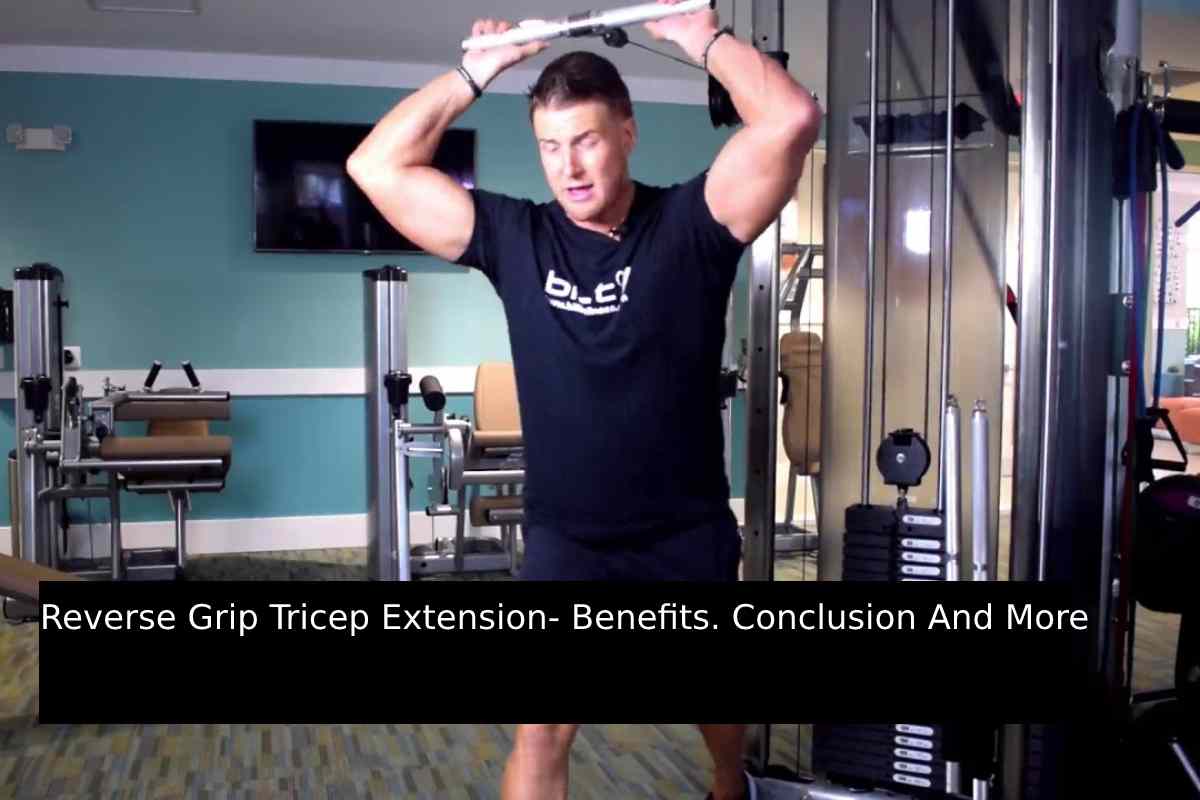Table of Contents
Reverse Grip Tricep Extension
Tricep extensions focus on the primary action of your triceps while also targeting the area of the muscle where additional mass is most visible. Weightlifters and bodybuilders around the world use this exercise to get that horseshoe-shaped tricep we’re all striving for.
We’ve written this workout guide to help our readers understand how triceps extensions work and highlight the reverse grip tricep extension as a particularly effective exercise for any arm day routine.
Reverse Grip Tricep Pushdown Exercise Details
Also Known As: Underhand tricep pushdown, supinated pushdown
Main Muscles: Triceps
Exercise Type: Strength
Exercise Mechanics: Isolation
Difficulty Level: Beginner
Equipment Needed: Bar attachment, cable machine
How To Do Reverse Grip Tricep Pushdowns?
- Connect a bar attachment to a high pulley.
- Grab the bar with a firm, underhand grip and then step away from the machine.
- Bend over slightly (while keeping your spine straight) and brace your core.
- While keeping your elbows pinned to your sides, flex your triceps to push the bar down.
- Keep pushing until your elbows reach complete extension.
- Squeeze your triceps forcefully at the bottom of the rep.
- Release the contraction in a controlled manner (don’t let your elbows drift forward).
- Raise the bar until it gets to around chest height, then perform your next rep.
- Perform 3-5 sets of 10-20 reps in total.
Reverse Grip Tricep Extension Benefits
Many people perform reverse grip tricep pushdowns without fully understanding the benefits that they can gain—with enough effort and consistency—from the exercise.
In addition to highlighting general pushdown benefits, this article explains how the reverse tricep pushdown is potentially much more effective than the overhand version of the exercise—especially over the long term.
Benefits Of Reverse Grip Tricep Extensions
We already know that reverse-grip tricep extensions target the medial head based on arm height. Alternating your grip won’t change that. However, it will stretch out the tricep more, leading to a better workout in the long run. Let’s explain using the first tricep extension we went through at the beginning of this workout guide. We explained it with an overhand grip.
When you stand in front of a pulley machine and grab the horizontal bar with an underhand grip so your palms are facing the ceiling, the first thing you’ll notice is that your wrist feels a lot more natural going through the exercise. This supinated grip allows your tricep to progress to the end of its range of motion.
Most lifters opt for the single-arm version of this exercise so they can concentrate on a full tricep workout on one side of their body at a time.
You’ll start to feel the burn on the outside of your arm where the long head of the triceps attaches to the shoulder, very near your lats. The long head will get a bit more of a workout compared to the overhand grip version and the medial head will also work harder since the lift is slightly longer. Overall, the entire triceps works harder in this move.
It’s already difficult for other muscle groups to take over if you’re doing overhand grip tricep extensions and with the underhand grip it’s all but impossible because there is no temptation to lean forward away from the machine. Another fantastic benefit is the variation this exercise offers for your workouts. It’s an easy alternative for tricep extensions that are already part of your program and fits in well with similar upper arm exercises.
Common Form Errors In Tricep Extensions
No matter which variation you choose to use, there are a few things you need to keep in mind if you want to ensure your tricep extensions are productive.
Leaning & Drifting:
Elbow drifting and leaning forward at the torso are natural responses to resistance. The position of the cable extensions makes this less likely, especially if you’re using the reverse grip stance and pulling from the side.
Foot Placement:
In some of these variations, keeping your feet too close together can lead to unwanted bending. Your feet don’t need to be too far apart but consider bracing yourself against a wall or a pulley machine to stay in place.
Non-tricep Recruitment:
Leaning and improper elbow placement can cause your lats, pecs, core, shoulders, or biceps to enter into the picture and rob your triceps of gains. Think of this as an isolation exercise for your triceps even though there is some secondary recruitment in these other muscles. Remember, the triceps only power the hinge motion of the elbow joint. Focus on making that movement to give the triceps and challenging targeted workout.
Conclusion: Who Should Do A Reverse Grip Tricep Pressdown?
If you want to challenge your triceps while keeping your wrists in a joint-friendly supinated position, then the reverse grip tricep pushdown is definitely worth including in your workout routine.
The reverse grip cable extension encourages you to keep your elbows close to your sides, which in turn helps you to maintain the proper muscle-building form, something that results in an intensified peak contraction.
It’s best to perform the standing reverse triceps extension toward the end of your workout because you’ll be utilizing higher repetitions.
This high-rep training style enables you to end your session with an intense triceps pump and plenty of volume. In other words, high-rep underhand tricep extensions—performed in conjunction with heavier exercises earlier on in the workout—are a recipe for muscle growth.

